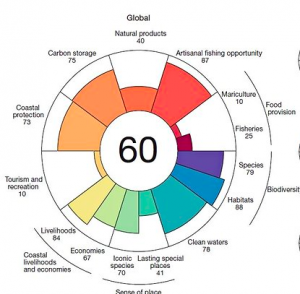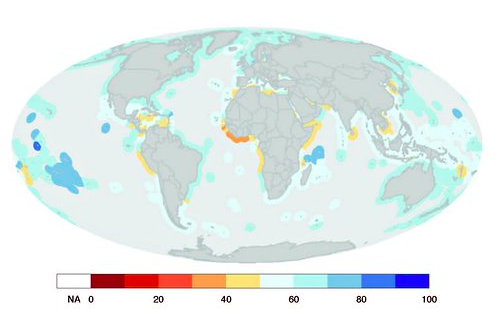Ocean Health Study Raises Concerns, Offers Some Hope
 A comprehensive study of global oceanic health gave the world’s oceans a score of 60 out of 100.
A comprehensive study of global oceanic health gave the world’s oceans a score of 60 out of 100.The Ocean Health Index, produced by an international team of scientists, policymakers, and conservationists, assessed the vitality of 171 coastal countries and territorial regions in ten categories, including ecological characteristics such as “Coastal Protection,” “Biodiversity,” and sustainable seafood harvests, and economic qualities like “Coastal Livelihoods and Economies” and “Tourism and Recreation.”
The study is “the first comprehensive global measurement of ocean health that includes people as part of the ocean ecosystem,” and is designed to help strengthen national and regional efforts to preserve our coastal environments and evaluate marine health. Dr. Mike Fogarty of NOAA’s Northeast division said “the index will complement the agency’s efforts” to manage ocean ecosystems under the 2010 National Ocean Policy.
National scores ranged from an 86 for the uninhabited Jarvis Island to a 36 for Sierra Leone, whose seas have received little protection due to prolonged civil war. The worldwide average of 60 “gives us a lot of concern, but also a lot of hope,” said Ben Halpern, one of the leaders of the project. The study found that industrialized countries with greater resources to protect their coasts tended to score better than developing countries.

The United States ranked 26th, with a slightly above average score of 63. The breakdown included a score of 97 for Coastal Livelihoods and Economies, but also a 25 for harvesting seafood sustainably. The Center for Ocean Solutions Science Director Larry Crowder said that the score reflects “reasonably depleted” American fish stocks, but “trends in recent legislation have us on a track of rebuilding those stocks,” and “fisheries should be getting better, based on actions we’ve already taken.”
As detailed by the Center for American Progress, healthy oceans provide a wealth of resources that can act as strong economic drivers. In 2009, coastal industries contributed $153.1 billion to the U.S. GDP, including $82.1 billion from tourism and recreation alone.
The ability to monitor and compare ocean health is an important tool for effectively managing and preserving coastal economies. The Ocean Health Index represents a positive step toward international efforts to monitor the seas, which will allow researchers to better understand the impact humans have on marine environments — along with the benefits countries reap from them.
You can return to the main Market News page, or press the Back button on your browser.

